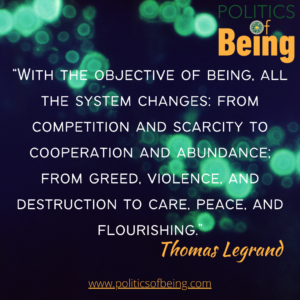
With the Objective of Being, all the System Changes
En excerpt from the book chapter: Economy
“By allowing all beings to receive everything they need, to offer all they can, to become all they are, we can prompt human, social, and environmental regeneration and set up a dynamic of authentic mutual enrichment. With the objective of being, all the system changes from competition and scarcity to cooperation and abundance; from greed, violence, and destruction to care, peace, and flourishing.
[…]
The first thing is to change the meaning and measure of success from having to being. As we have seen throughout this book, this simply means uncovering the lies at the core of our economic system. When we collectively recognize that money is not the key to our fulfillment and its insane accumulation is often pathological, people will naturally cease to treasure it. “Success isn’t about how much money you make; it’s about the difference you make in people’s lives,” said Michelle Obama. When we agree that a truly fulfilled and admirable person is in service of all, people will work again for the greater good.
The quest for money, as for any extrinsic reward, is often based on insecurity and the need for a positive evaluation from others, which in turn is nourished by advertising and the economic system. When we see this understanding in the eyes of our partners, our friends, our parents and children, our colleagues and neighbors, we will certainly change our ways and heal. As humanity grows into adulthood, it will become less necessary to treat people as children, using systems of rewards and punishments to foster right behaviors. At the social level, many destructive activities will simply no longer be tolerated—the change in values we are contemplating might someday make them unthinkable. Our value system focuses our collective attention and determines what is possible.
At the national level, this would translate into new indicators of success. Instead of having the highest GDP, countries would pride themselves on having the most fulfilled, happiest citizens, who care for each other and respect nature.
Some measurement systems aggregate these different dimensions in one indicator, while others provide a set of indicators. Developed under the technical guidance of professors Michael Porter from Harvard Business School and Scott Stern from the Massachusetts Institute of Technology, and based on the work of Economics Nobel Prize recipients Amartya Sen, Joseph Stiglitz, and Douglass North, the Social Progress Index is one of these alternative indicators. It has been adopted among others by Paraguay, the European Union, and California. Instead of looking at economic means, it focuses on human, social, and environmental achievements. Its definition of social progress to some extent resonates with our views:
The capacity of a society to meet the basic human needs of its citizens, establish the building blocks that allow citizens and communities to enhance and sustain the quality of their lives, and create the conditions for all individuals to reach their full potential.
As usual, Nordic countries occupy the top ranking while the US lags behind (ranked twenty-sixth in 2019). A change in the international distribution of power could support this redefinition of success. If China, for example, is able to reconnect to its soul, it could tap into its rich culture and ancestral wisdom to promote new indicators of progress and a healthy global leadership.
This new “being” bottom line does not only apply to the public sector. Companies can also redefine their purpose and assess their performance, such as in terms of happiness and well-being. To change our value system, we need a critical mass of committed leaders in all sectors at all levels: business men and women, bankers, journalists, researchers, presidents, ministers, governors, mayors, civil servants, etc. They all need to take responsibility, stand up, and come together. What we need is the willingness to act; strong individual, organizational, and political commitments that can bring about this transformation in a generation’s time. I can’t think of anything more exciting.
Many people who are now holding money and power fear this change, but the present economic system will sooner or later either profoundly evolve or collapse. Fear is a human reaction often triggered by trauma, but there is no escape. Increasingly people will have to face their own responsibility in the upcoming tragedies. If they are able to elude their own consciousnesses, their children and the world around them will hold them accountable. It is already happening; can you imagine 2040? On our deathbed, we will all have to ask ourselves: what have we done for the Earth and all its children?”
